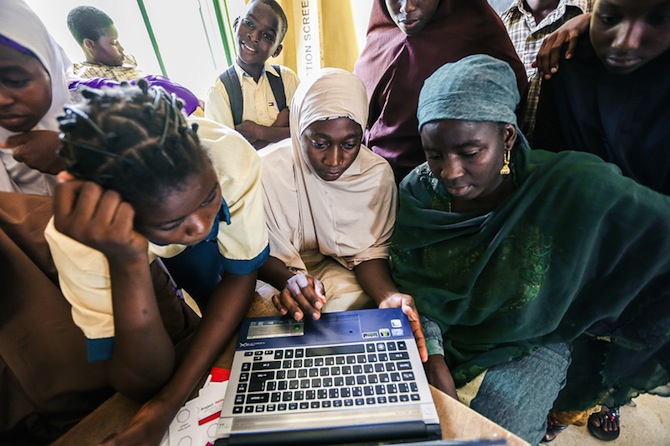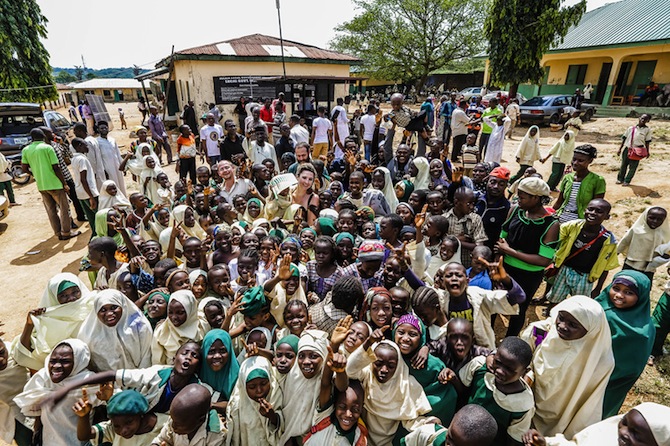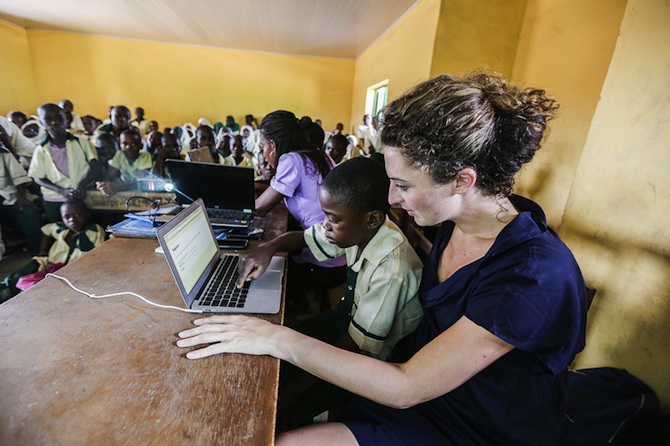
Attempts to educate underprivileged children and youth in rural areas without access to schooling area nothing new. There are many people and organizations who admirably want to help and showcase the importance of education; however, the issue becomes not only finding a solution that works, but also finding one that is sustainable and responsible. While Project Hello World still has a long way to go before they conquer the problem of eliminating the issue of lack of education, they’ve found a successful beginning in Nigeria.
Project Hello World was founded by Katrin Macmillan, who has a background in media and aid agency consulting, and Dr. Geoff Wells, an expert in community technology education and sustainable building technology, who believe every community has the cultural capital to begin solving their problems. They wanted help a support and accelerate the process. To Macmillan, education is the key to equality, and could help to lift many out of poverty.
Says Macmillan, “I have lived in Africa for many years. And every vulnerable community that I have lived and worked with has expressed a desire for their children to have a better life, and to tell their story – to exist to the world map. No matter how marginalized and impoverished, all people want to pass on their stories and share their heritage.”
It all started when Macmillan was staying with the Hamar Tribe in South Omo, on the Ethiopian border with Kenya. According to Macmillan, the Hamar are possibly the most marginalized people on earth and truly desire for their children to be educated, not to mention their existence and story to be documented.
“That’s when I called Roland Wells and Project Hello World was born!” says Macmillan. “We want to democratize education worldwide. As a start, by 2019 we aim to have reached over 2 million children with a limitless education.”

Hello Hubs
The key to the project is something called Hello Hubs, solar-powered computers that allow children to use educational software and play learning and skill-enhancing focused games. At the same time, these hubs collect data that allows Project Hello World staff to note the educational progress and usage of the hub. Onsite, a community support officer works with the children in person to offer another layer of dynamics.

A Sustainable Cycle
So, how do these children who have never seen a computer learn how to operate these Hello Hubs? What’s important to understand is these computers aren’t built for children, but by children. The project coordinators support them in doing this, and show them how to operate and maintain the technologies. The idea is that the spending of labor leads to an investment in maintaining the outdoor solar-powered computers — which allows access for all, even the homeless. From there, a community registration team is trained on how to use the computers once they’re built, and these team members then go on to train others. Once the hub is in place it is maintained by the community, although Project Hello World is available on Skype to provide guidance and training when needed.
These computers come loaded with educational programs and activities for children aged two and up, with some resources including KDE Education Porject, GCompris, Tux4kids projects and an application-filled Ubuntu Software Center. With this model, the Project Hello World team hopes to encourage communities to solve their own problems.
The Problem With Most Foreign Aid Projects
Which gets to the issue of what many organizations are potentially doing wrong: creating projects that leave impoverished communities dependent on outside support. For many projects, the process seems to be to define a community problem, go in, solve it and leave. Macmillan especially believes this model is harmful, as it also means the community doesn’t own these local developments and don’t have any investment in the project.
Says Macmillan, “Often I am asked for a well or a school, at first, as they know these are the things development workers usually have to offer. When I say that I don’t have these things with me, and ask if those are their needs — clean water and classrooms — they are sometimes confused by my presence. What am I doing there if not to give them something? It can take awhile to work out what their problems really are, and how they want us to tackle these problems, together.”
To learn more about Project Hello World, click here.
Also Check Out:
Tracing The Heritage Of The Delicious Bakarkhani From The Mughal Era To Present Day South Asia
How Coffee Is Helping Bring World Peace
Jessica Festa
Latest posts by Jessica Festa (see all)
- A Culturally-Immersive Adventure In Mongolia’s Altai Mountains - Jul 8, 2023
- This Recipe Sharing Platform Supports Women In The Culinary Industry (Labneh Recipe Included!) - Nov 5, 2020
- Hiking The Mohare Danda Community Eco-Trek In Nepal - Jun 3, 2020
- 6 Important Questions For Choosing A Responsible Yoga Retreat - May 18, 2020
- How To Create & Grow A Profitable Blogging Business (Ethically) - Jan 18, 2020





You make a powerful statement when sharing Macmillan’s quote. Parents do anticipate better lives for their children and solar-powered computers are one path to make this more possible, just as you claim.
You just shared a great insight about solar powered computer
These computers make the life of underprivileged children most beautiful
This is really a great effort to improve the technical skills of underprivileged children. Every child has a right to learn quality education and technical skill. I really love this article and I also work for QandA that is a platform for students, teachers and other related people to discuss their thoughts and experiences on learning and other topics. You can also visit https://qanda.typicalstudent.org/ to share your thoughts.
Education is the right of every child and it is the foundation of one’s life. Children of today are the future generation and education is the pillar of development. Education itself eradicates a lot of problems in the society. There are many barriers to getting education and a lot of children just dream of getting education. This Hello World project is such a nice initiative to improve the lives of underprivileged children. This way less privileged children can get the benefits of education and get use to the technology. This is a great way to bridge the gap between urban and rural education.